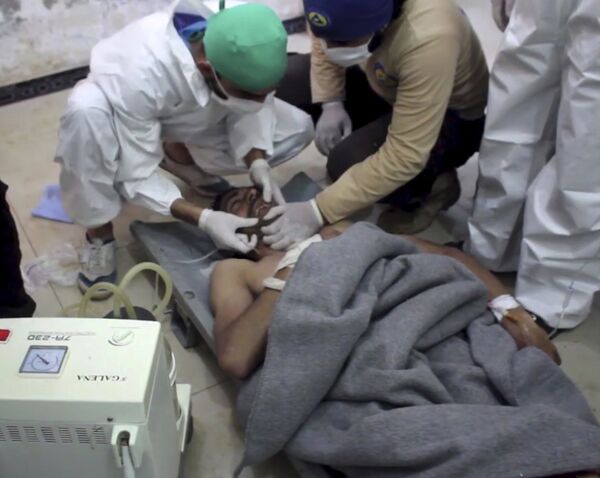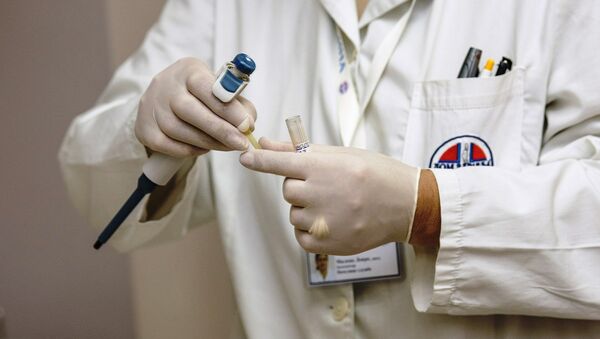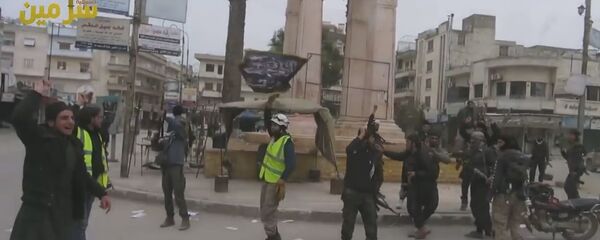In the immediate aftermath of the incident, Shajul Islam, 31, posted a flurry of photos on Twitter depicting individuals allegedly afflicted by sarin gas, and was subsequently interviewed by several mainstream television networks.
Paraded as the savior of innocent civilians, he repeatedly called for Western intervention in Syria, claiming the April 4 incident was merely the latest instalment of a concerted campaign of gas attacks, which was "continuing every day."
This is the latest from the Sarin attacks. Patients are still flooding in. This child's been rushed in w/o any family. They're probably dead pic.twitter.com/B4i9W97UfA
— Dr Shajul Islam (@DrShajulIslam) April 4, 2017
What the mainstream media didn't reveal, however, is that far from a modern day Florence Nightingale, Islam, who hails from Stratford in East London, was deemed a "committed jihadist" by the UK intelligence services.
#ShajulIslam the fake doctor trying to persuade us he is telling truth over chemical weapons 🤔🤔@Navsteva @RenieriArts #SyriaExposesLies pic.twitter.com/OFvrUBEvPN
— vanessa beeley (@VanessaBeeley) April 1, 2017
He first traveled to Syria in 2012 ostensibly to provide medical assistance in rebel-held areas of the country, such as Al Bab, but shortly after arriving was placed on MI6's wanted list for his potential role in the kidnapping of photojournalist John Cantlie and Jeroen Oerlemans. The pair were held captive for nine days after accidentally straying into a jihadist camp in northern Syria, where Islam was working. Subsequently freed by the Free Syrian Army, Cantlie has since been imprisoned by Daesh, and Oerlemans was killed by snipers in Libya in October 2016.
as #Raqqa & #Mosul fall, there's hope #JohnCantlie will return home to his family after 4 years prisoner of ISIS. #NeverForgotten pic.twitter.com/yC1YN1Z9aC
— little caesar (@littlecaesar50) April 1, 2017
Islam claims he was a mere medic, not affiliated with any terror group, but was nonetheless arrested at Heathrow Airport upon his return to the UK in 2013, held by Sussex Police's specialist counterterrorism units, and subsequently charged alongside younger brother Najul Islam, who worked in the UK Department for Work and Pensions before traveling to Syria, and Jubayer Chowdhury.
Only one "Dr. Shajul Islam" has been registered in the UK. He was suspended in 2012 until he got erased last year. https://t.co/JVhGZm5G01 pic.twitter.com/tv0yXD0ZOE
— Lina Arabi (@LinaArabii) April 5, 2017
All three were held in high security Belmarsh Prison until their trial in Kingston Crown Court — but in November 2013, the Crown Prosecution Service announced they were unable to proceed with the trial, as Cantlie and Oerlema were unable to attend court and give evidence.
"The two victims in the case are the two prosecution witnesses on which the case rested wholly on their evidence. The prosecution are unable to call either victim for the purposes of the trial listed today," the CPS said in a statement.
After the collapse of the case, Shajul and Najul returned to Syria.
Shajul was struck off the General Medical Council in March 2016, after a 16-day tribunal. He is currently ensconced in Idlib, the site of the chemical weapons incident, and one of the few remaining rebel strongholds in Syria.

Reports have suggested the city's rebel government is brutally repressive, ethnically cleansing religious and ethnic minorities, banning music and instituting a violent theocratic rule of law under which women accused of adultery are publicly executed.
Robert Stuart, an independent researcher who has documented potential fakery in the 2013 BBC Panorama documentary Saving Syria's Children, told Sputnik that what's most shocking about Islam's elevation to "star witness" in the media is the same outlets also reported his arrest, and subsequent flight to Syria in 2016.
What's more, he is not the first individual in Syria with unacknowledged militant connections to be provided a platform by the media.
Dr. Rola Hallam, a member of charity Hand in Hand for Syria's executive committee, was the centerpiece of Saving Syria's Children, and has often been interviewed about the country's humanitarian situation on television. She is typically presented as an independent medical practitioner treating wounded civilians — although there is much to suggest the charity is closely aligned with the Free Syrian Army.
For instance, Hand in Hand's original logo was based on the flag adopted by the Free Syrian Army — and until July 2014, the Facebook banner of the charity's co-founder, Faddy Sahloul, read "WE WILL BRING ASSAD TO JUSTICE; NO MATTER WHAT LIVES IT TAKES, NO MATTER HOW MUCH CATASTROPHE IT MAKES."
Basing stories on information garnered from questionable sources has become a key hallmark of news reporting on the Syria conflict.
For instance, the Syrian Observatory for Human Rights frequently pops up in mainstream news reporting, but while typically described as a "monitoring group," the organization consists of one man, who has not visited Syria in over a decade, conducting research from his bedroom in an English town.
While the media is resolute in the conviction that the incident was an attack, carried out by government forces, Western leaders and chemical experts are more circumspect.
At an April 4 press conference, Staffan de Mistura, UN Special Envoy for Syria, said he was yet to receive any reliable confirmation on the source and nature of the incident. Federica Mogherini, High Representative of the EU for Foreign Affairs and Security Policy likewise said, "we do not have evidence at the moment."
The Organization for the Prohibition of Chemical Weapons likewise did not apportion blame for the attack, and noted Syria had destroyed at least 95 percent of its chemical weapons reserves.





